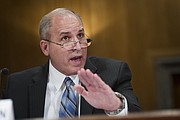WASHINGTON -- President Donald Trump on Saturday delayed a nationwide immigration sweep to deport people living in the United States illegally, saying he would give lawmakers two weeks to work out solutions for the southern border.
The move came after House Speaker Nancy Pelosi called Trump on Friday and asked him to scrap the raids. But three administration officials said calling off the operation was not just about politics. They said Immigration and Customs Enforcement leaders had expressed serious concerns that officers' safety would be in jeopardy because too many details about the raids had been made public.
The officials spoke on condition of anonymity to talk about private discussions.
"At the request of Democrats, I have delayed the Illegal Immigration Removal Process (Deportation) for two weeks to see if the Democrats and Republicans can get together and work out a solution to the Asylum and Loophole problems at the Southern Border," Trump wrote on Twitter. "If not, Deportations start!"
The tweet came after immigration advocates and officials in some major U.S. cities condemned plans for Immigration and Customs Enforcement raids aimed at rounding up thousands of families facing deportation orders.
Hours before his tweet, Trump spoke from the White House lawn Saturday before departing for Camp David in Maryland. Trump said that "exportation raids are groups of very, very good law enforcement people going by the law, going by our court system taking people out who came in illegally and out legally."
He anticipated that "some cities are going to fight it," but he said the resistance was from sanctuary cities, which, along with some states, have policies aimed at protecting migrants from deportation.
Trump gave the first public word of the planned sweep last week, saying in a tweet that an operation was coming up and that the agency would begin to remove "millions" of people who were in the United States illegally. Later, leaks to the media included sensitive law enforcement details, such as the day it was to begin, today, plus specific cities and other operational details.
On Saturday, Immigration and Customs Enforcement spokeswoman Carol Danko criticized the leaks in the context of their potential effect on agency personnel, saying in a statement that "any leaks telegraphing sensitive law enforcement operations is egregious and puts our officers' safety in danger."
Pelosi called Trump on Friday night, and the two spoke for about 12 minutes, according to a person familiar with the situation who was not authorized to discuss it publicly. Pelosi asked Trump to call off the raids, and he said he would consider the request, the person said.
Halting the flow of illegal migration has been Trump's signature campaign issue, but his allies in Congress have been unable to push his proposals into law because of resistance from both Democrats and Republicans.
Lawmakers are considering whether to give $4.6 billion in emergency funding to help border agencies struggling to manage a growing number of migrants crossing the border. The measure cleared a Senate committee on a 30-1 vote. But the House is considering its own measure. Funding is running out, and Congress is trying to approve legislation before the House and Senate recess this week.
CITIES PUSH BACK
The reports that Immigration and Customs Enforcement planned to conduct large-scale enforcement actions have prompted push-back from Democratic mayors in Los Angeles; Chicago; San Francisco; Newark, N.J.; and New York. Those leaders have condemned the plans and launched efforts to aid residents.
Several of those cities identify themselves as sanctuary cities. A handful of major metropolitan police departments have also announced they will not cooperate with federal immigration authorities.
In addition, civil- and immigration-rights organizations such as the American Civil Liberties Union and National Immigration Law Center have been publicizing the rights that migrants have in the event they are stopped or visited by law enforcement authorities.
While cities must comply with federal law enforcement officers, their leaders can use their platforms to educate residents about what to do if authorities approach them, said David Leopold, an immigration attorney and former president of the American Immigration Lawyers Association.
"Nobody's trying to stand in the way of law enforcement, but what mayors can do is make sure that their citizens, their constituents, know their rights," he said.
For police departments, cooperation with immigration officials could weaken communities' trust in police, Leopold said. He added that local authorities may not be trained in the nuances of immigration law and the rights of migrants in the country illegally.
In cities such as Los Angeles and Atlanta, advocates and attorneys have held "know your rights" workshops in schools, churches, storefronts and consulates, tailoring their efforts on what to do if Immigration and Customs Enforcement shows up at home or elsewhere.
The result, advocates argue, is that more savvy migrants are increasingly refusing to open their doors or provide information, something they hope will blunt the effects of any operation.
"It's more about making sure that people feel like they have some power over what is happening in their lives," said Katarina Ramos, a National Immigrant Justice Center staff attorney. "And that they have some control over what is inherently a very scary situation."
Leaders and law enforcement authorities in California's major cities have taken some of the strongest stances against the Trump administration's planned action.
Oakland Mayor Libby Schaaf, who sparred with Trump over her city's sanctuary-city policy in April, said on Friday that while she did not have specific information about "raids in this community," she urged residents to "not panic." Earlier last week, she called the president's behavior "ruthless and reckless" during an appearance on CNN, and she appeared to imply in a tweet that the city would take action if it received "credible information" about planned immigration enforcement action.
Schaaf had previously alerted residents about potential Immigration and Customs Enforcement raids in 2018, drawing Trump's ire.
San Francisco Mayor London Breed pledged in a statement that "we will continue to remain vigilant and offer services for all immigrants through the Office of Civic Engagement and Immigrant Affairs," ABC 7 reported.
The San Francisco Police Department said "it does not and will not" cooperate with Immigration and Customs Enforcement or Customs and Border Protection officials to carry out deportations.
The Los Angeles Police Department confirmed that it was aware of the planned raids and would not participate. Mayor Eric Garcetti said on Twitter that his administration was "doing everything we can to provide immigrant families with info and support ahead of the announced [Immigration and Customs Enforcement] deportation sweeps."
Similarly, in Chicago, Mayor Lori Lightfoot announced that the city's Police Department had revoked U.S. Immigration and Customs Enforcement access to some of the city's databases, and that Chicago police would not "cooperate with or facilitate any [of the agency's] enforcement actions."
In a tweet addressed to the president, New York Mayor Bill de Blasio said that residents "won't be divided by a sick plot to tear families apart and force immigrants into the shadows," while the mayor of nearby Newark, Ras Baraka, joined other urban mayors from around the state in calling the raids "racist, bigoted, and inhumane."
The Washington Post reported last week that the Justice Department, which runs the immigration courts, said it was aware of at least 12,780 removal orders issued to "family units" from Sept. 24 through Friday.
On June 4, Immigration and Customs Enforcement's new chief, Mark Morgan, said that the agency was developing plans to target families who had not heeded orders to leave the United States.
"Our next challenge is going to be interior enforcement," Morgan said at the time. "We will be going after individuals who have gone through due process and who have received final orders of deportation."
Morgan confirmed that plan would include families. He pledged that immigration officials would treat those families "with compassion and humanity."
OKLAHOMA PROTEST
Separately, demonstrators including Japanese Americans who were detained as children by the U.S. government during World War II spoke out Saturday against the Trump administration's plans to house migrant children at an Army base in Oklahoma.
At a park near Fort Sill, protesters hung paper cranes that organizers said were folded by people from across the country. Speakers decried the internment of Japanese Americans during World War II and spoke out against detaining asylum seekers and migrants.
Hundreds of Japanese and Japanese American people were detained at Fort Sill by the federal government during the war with Japan. The federal Office of Refugee Resettlement recently announced plans to temporarily place up to 1,400 children at the base, which is near Lawton. Fort Sill also housed migrant children in 2014 under President Barack Obama's administration.
Ahead of the protest, about two dozen people gathered at the base for a news conference. A man in a military uniform told them to leave, but they stayed and finished the news conference before heading to the park.
Record numbers of unaccompanied children have been arriving at the border, largely from Guatemala, Honduras and El Salvador. In May, border agents apprehended 11,507 children traveling alone.
Information for this article was contributed by Colleen Long, Lisa Mascaro, Sophia Tareen, Andrea Smith, Philip Marcelo and staff members of The Associated Press; and by Kayla Epstein and Colby Itkowitz of The Washington Post.
A Section on 06/23/2019

